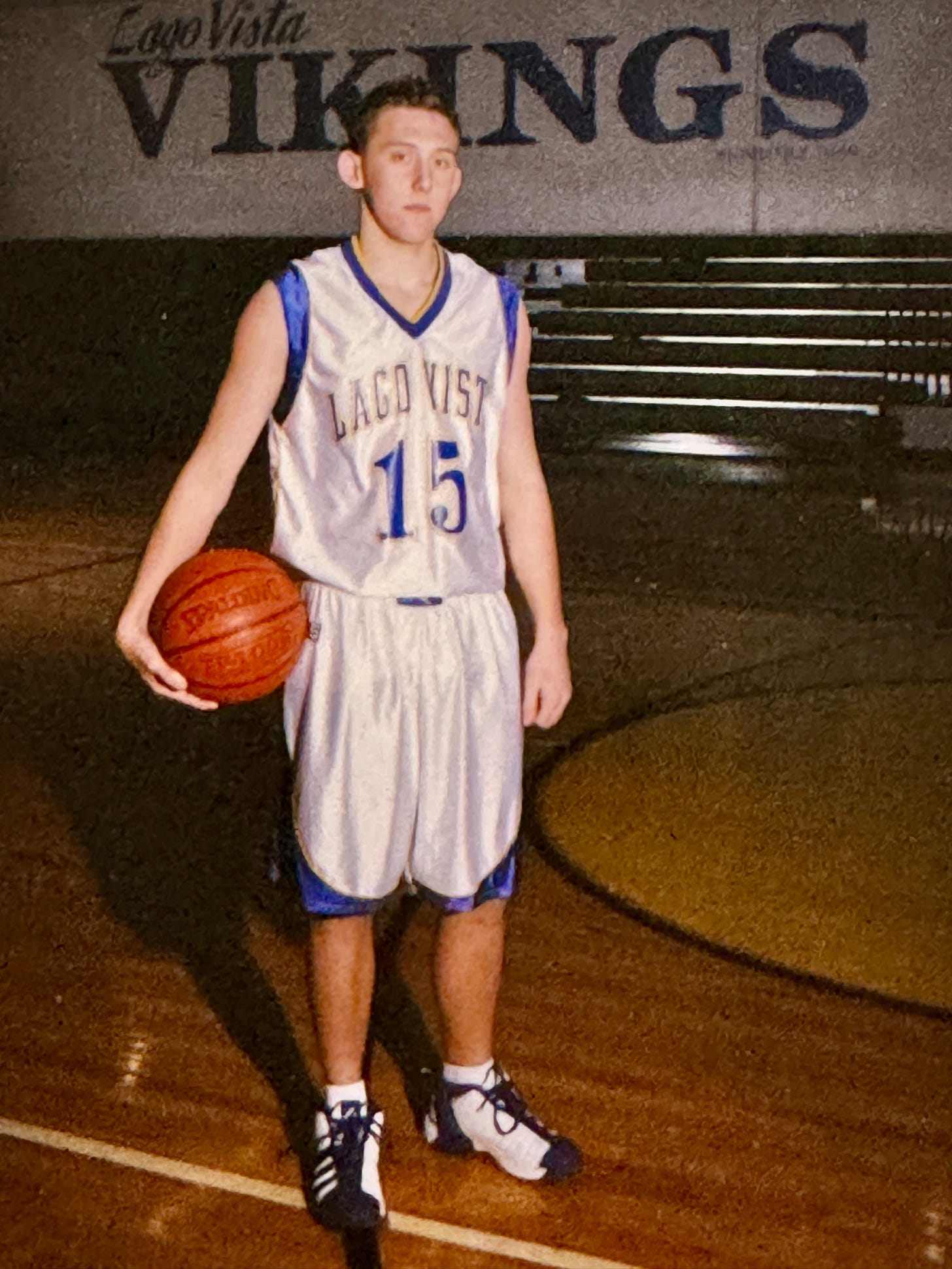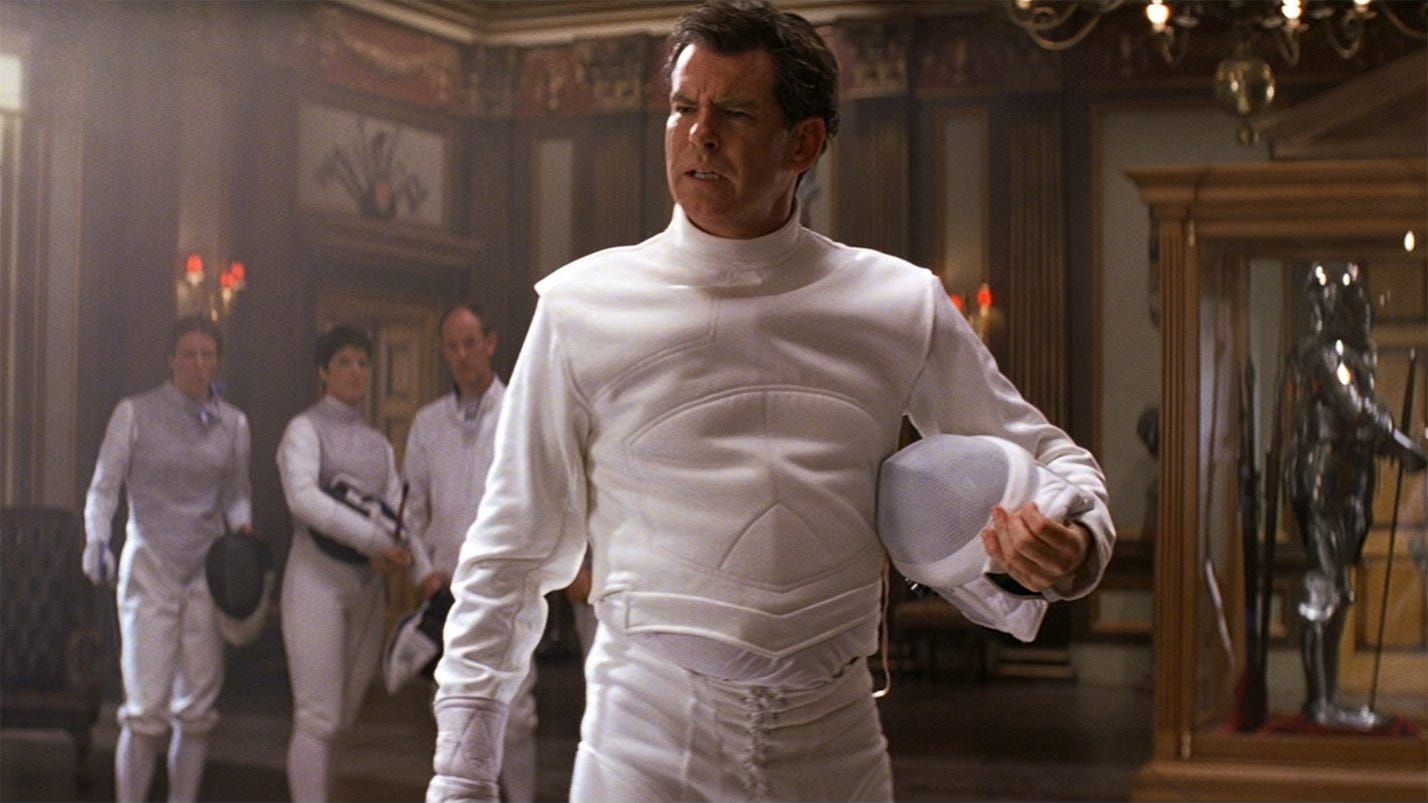I almost became James Bond
My son Sage started playing baseball this fall, and naturally, I can’t help but coach him during practices and games. Watching him learn a new sport has me reflecting on the many sports I’ve played over the past 35 years. Even at West Point, every cadet must compete in a sport in order to develop physical and mental fitness, build character, and cultivate the will to win - skills that are essential to leading soldiers as an Officer.
From team sports like football and baseball to more individual challenges like jiu-jitsu, each one has taught me lessons that have shaped me as a leader, businessman, and overall person. When considering what sports your kids (or you) might want to explore, consider the skills and attributes they can develop. Here’s what I’ve taken away from each:
Baseball: the Power of Patience and Precision
Baseball is a thinking man’s game because the scenario changes on every pitch. I grew up playing catcher (now they change out the catcher after a couple of innings because it’s such a brutal position), which gets a lot of action throughout the game. However, I switched to 3rd base during my senior year of high school. Baseball is like the military, a lot of waiting for sudden and intense action. I have never been considered a patient person, just ask my family when we are trying to get out of the house to go somewhere. Baseball helped me practice better patience by learning to wait on the perfect pitch and staying alert in defense. In business or entrepreneurship, opportunities will come, and if you jump on any opportunity without waiting for the perfect pitch, you’ll likely have a lot of strikeouts.
In baseball, if you are successful at bat 30% of the time, you can be in the Hall of Fame. That is how hard it is to hit a baseball consistently. The odds of a successful business making it past five years is around 50%, and only a 30% success rate over ten years. To spend three to five years on something that doesn’t pan out can be a tough pill to swallow, and it takes some time to recover the confidence to start over. Waiting for an opportunity that fits perfectly with a real problem to solve, a market willing to pay, and aligns with your skill sets is critical to long-term success.
Opportunity = Passion + Resources + Timing + Realistic Solutions
Takeaway: Like a batter waits for the right pitch, entrepreneurs must wait for the right opportunities. Success isn’t about swinging at every pitch but making the most of the right ones.
Football: The Importance of Teamwork and Strategy
My first year playing football was my freshman year in High School, and it was also the first year my high school ever had a football program, so most of the team had never played as well. We were between re-districting, so we had to play anyone who would play us. We ended up being everyone’s Homecoming game with a guaranteed win. By the time I was a senior, we were better, but we were still not making it to the playoffs. Playing football was probably the most fun I had on a team, despite all the losses. Everyone has a specific role, and you must trust your teammates to execute their role on every play.
Football is a great team sport—no single player can win a game alone. Every position has a specific role, and success hinges on everyone executing the game plan. I heard someone once say that a mistake is made on every single down of football. In business, having the right strategy and ensuring every team member understands their role is critical to success.
Takeaway: Like football, business is a team sport. Surround yourself with the right people with the right skills for their roles and build a strategy everyone can execute. Success comes from alignment and execution.
Basketball: Adaptability and Quick Decision-Making
I was one of the oldest in my grade, so I was always one of the taller kids growing up. Summers at the Rec playing HORSE and pickup games made me decent at basketball. I peaked my freshman year, though, and couldn’t play my sophomore or junior year due to injuries (thanks to football), so I was a bit rusty in my senior year. I spent most of the time on the bench, eager to get out there. Funny story: I was once checked into the game and back out before the game even started back up.
Basketball is fast-paced and requires quick thinking, adaptability, and teamwork. You have to pivot quickly, change strategy mid-game, and trust your teammates to make the right moves. In business, the market and your competitors are ever-changing, and success often comes from being able to pivot and make decisions under pressure.
Takeaway: Stay flexible, adapt to changes quickly, and trust your team to execute when the stakes are high. Just like basketball, business requires constant movement and adaptability.
Crew: Synchronization and Relentless Discipline
I started rowing at West Point because I thought getting out on the water daily and getting a great workout would be fun. It was one of the most challenging physical sports I participated in. Rowing is the ultimate team sport that requires everyone to move the exact same way at the exact same time. Even a tiny mistake can completely derail a boat (or dumps everyone in the water). It also requires incredible discipline to get up super early (even for a military academy) to get on the water and practice before breakfast formation at 6:30 am.
In my novice year, we won our first heat and made it to the finals in the collegiate national competition at the Dad Vail Regatta on the Schuylkill River in Philadelphia. The only team that had a faster heat time was Temple. We were so close in time that we knew we could beat them in the finals and were ready to give everything to win. I was actually excited about pushing my limits to achieve victory. Unfortunately, halfway through the 2k race, one of my teammates “caught a crab,” which meant losing control of the oar and getting stuck in the water. The momentum of the shell came to almost a complete halt, and we were even turned off course a bit. I was devastated. We could have all given up then and eased our way to finish, considering we wouldn’t win the race. But instead, we got back on track and started to catch up to some of the slower boats. We got 5th place out of 6 teams in the final heat, only beating UNC. Being so close to a National Championship and losing it in the finals was tough, but I’m proud we didn’t give up and kept trying even though the first place was not in the cards.
Picture from the Dad Vails Race
The entire boat must be synchronized to row fast, as even the slightest misalignment can slow down the shell. In business, alignment between cross-functional teams—marketing, product, operations, engineering, and sales—is crucial for success. Without synchronization, your business can “catch a crab” and lose momentum.
Takeaway: Success requires everyone to row in the same direction. Alignment and discipline in business are vital in building momentum and sustaining growth.
Jiu-Jitsu: Resilience and Leverage
I was 31 when I started training jiu-jitsu and was already well into my career. I needed to get back into shape and get my competitive edge back. I had done some grappling at West Point and the Army (mandatory courses in close-quarters combat), so I knew enough to get beat up in a bar fight. My first week, I was bruised all over my body and could barely get out of bed; what was I thinking? But it was addicting because I needed to figure out how people smaller than me consistently beat me. The more I went, the more my body adapted to the abuse, and I have been hooked for over eight years now.
1st Place in the IBJJF Houston Open in March 2020 (a week before COVID shutdown)
Jiu-Jitsu is all about using leverage and technique, not brute strength, to overcome opponents. It teaches resilience—how to stay calm under pressure and find ways to turn a disadvantage into an advantage. There have been so many times when my only goal at the time was to find a way to breathe and then figure out the following problem after that. In business, it’s not always about having the most resources; it’s about using what you have wisely.
Takeaway: Resilience and leverage are great tools in business. Learn to stay calm, adapt, and use what you have to your advantage, even if your competitor is a giant.
Rock Climbing: Problem Solving and Risk Management
I have never rocked climbed competitively, but it has been an off-and-on hobby of mine since I took a rock climbing PE class at West Point (my highest grade at the academy unfortunately). I’ve always been decent at pull-ups and have a firm grip, so I took to it naturally. I also learned that rock climbing, like crew, requires more leg strength than upper body strength if you do it right.
Rock climbing teaches you to analyze a route before climbing, assess risks, and make quick decisions when most vulnerable. You must constantly problem-solve to find the best path while managing your fear of failure. In business, this translates to calculated risk-taking and solving complex problems by breaking them down into manageable steps.
Takeaway: Like rock climbing, business requires careful risk management and strategic problem-solving. Success comes from trusting your preparation and making smart, calculated moves to reach new heights.
Fencing: Anticipation and Precision Execution
I tried fencing for a while because I had to do some sport in the fall before Baseball started. I figured I would try it out since James Bond seemed pretty good at it in “Die Another Day” (seriously, I wanted to be like James Bond). It ended up being a lot harder than I thought and took excellent hand-eye coordination and reflexes to get good at. I don’t know if I got up to James Bond standards, but I think I could hold my own if a sword fighting situation came up.
Same
Fencing is a sport of strategy, quick reflexes, and precision. You have to anticipate your opponent’s moves while simultaneously planning your own. In business, anticipating market trends and competitor moves is essential, but it’s precision in execution that sets you apart.
Takeaway: Fencing teaches the value of thinking ahead while focusing on executing flawlessly. Businesses that anticipate and act with precision are the ones that win.
Conclusion
Each sport has taught me valuable lessons, from patience in baseball to leveraging opportunities in jiu-jitsu. Success in both sports and business comes from discipline, teamwork, adaptability, and resilience. Every game, every practice, and every competition has shaped how I approach challenges today. So, get out there and play.
Don’t get captured,
Zach
Also, Check out the Prof Z Project Library, where I have added many resources (books, tools, articles, podcast, and video recommendations) for different topics such as entrepreneurship, leadership, operations, finance, personal development, real estate, AI, fintech and even health and fitness. It's a free resource, so enjoy a single location for useful things I have found. Send me a message with any suggestions to add to the library.










